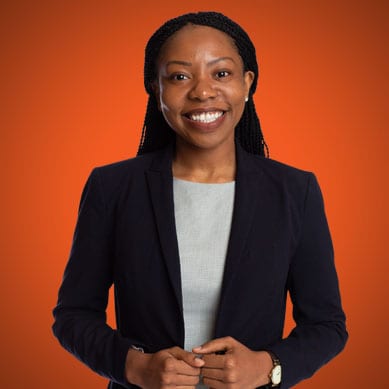Ezinne Nwankwo is a PhD student in the Department of Community Health Sciences in the Fielding School of Public Health at the University of California, Los Angeles. She is a part of the Health Policy Research Scholars Cohort 2018.
Before we begin, tell us a little bit about yourself and what your research interests are?
I was born and raised in Lagos, Nigeria, and lived there until my family moved to San Francisco, California in 1999. My upbringing in these two places shaped my beliefs about equity and social justice. I learned early on that structural forces influence people’s ability to access necessities—like food and shelter—and that though countries are economically and culturally different, the inequities that their citizens face are born of the same disregard for human dignity. My research interests center on the social determinants of migration and immigrant health, which includes access to social welfare and health programs to restrictive immigration policies that keep families apart.
What’s the story behind why you’re doing what you’re doing?
Growing up, I often thought about what it meant to be influenced by two countries despite being primarily in one. I did not know that sociologists had already been writing about transnational ties—the connections immigrants maintain to their homelands. In some ways, this view relaxes the assumptions of assimilation and acculturation to include the possibility of a rich and full existence in two places. But this transnational orientation can have positive and negative consequences on immigrants, and I’m curious to learn the implications for health and well-being.
Tell us about a project you are currently working on that you are excited about?
I am very excited to spend some time this summer on a project that focuses on Caribbean migrants. I will explore existing immigrant health theories and test whether these frameworks hold for this immigrant population. Specifically, I will examine why these immigrants return to their country of origin and compare their physical and mental health with people who have never left the Caribbean. I am even more excited to focus my research on African and Black immigrants, a group that receives limited attention in immigrant health research.
For people unfamiliar with your research area, what is one piece of information you think is important for them to know?
I think it is essential for everyone to know that when we talk about immigrants, we are talking about people. How they arrived in the country should not take away from this basic fact. Still, in the current anti-immigrant climate, it bears mentioning.
Who is a researcher you admire and why?
It is difficult to name just one. I admire researchers for different reasons. Some I admire just for the depth of their inquiry and research, and others I admire because they tell the truth. I appreciate researchers that use the research methods that are prevalent in their field and at the same time recognize that these methods cannot fully account for the nuances of everyday life.
How has being an HPRS Scholar helped you during your time as a doctoral candidate?
The HPRS program has been a tremendous resource in my academic and professional development. Even with my public health background, I never envisioned that policy would take center stage in my work. The program has broadened my vision for what a career that bridges research, policy, and community advocacy might look like.
It has also been incredibly inspiring to meet other HPRS Scholars and people from RWJF’s leadership development programs. We all come together under the Culture of Health framework because we understand that complex social factors shape health. Although we may use different terms for similar things, we have the same overarching goal. This grounding pushes me to think holistically about my research and allows me to remain open to suggestions and alternative solutions to the issues that I encounter in my work.
Last but not least, my HPRS coach, Dr. Adeola Sonaike, has been an amazing resource, especially in keeping me accountable to my goals. I’m looking forward to maintaining our relationship even after I graduate.
In the RWJF HPRS program we have worked with you to help you think further about using your research to develop policy. If you could use your research to change any policy, what policy would it be?
Immigration policy in the U.S. is frequently described as a pendulum. It swings back and forth as the federal administration changes. These shifts mean that many immigrants live their lives surrounded by uncertainty. Their U.S. citizen family members are also deeply affected by this ambiguity, and the stress they face contributes to poor health outcomes. The U.S. needs comprehensive immigration reform. The current zero tolerance approach to immigration that has led to—the travel ban, mass deportation, and children being separated from their families—is not the way forward.
Ok, here’s a fun question to wrap things up. If you were stranded on a desert island, what three items would you want to have with you?
I would bring a solar-powered phone charger and a phone that’s loaded with audiobooks, podcasts, magazines, news articles, and the Wikipedia pages of African historical figures and events. I would also include a how-to collection on any topic. I’m open. Possibly something I can do on the desert: “How to survive while stranded on a desert island” seems appropriate. If there’s a food item that can last for a long time, I would also add that. If I can include my parents and siblings, I would bring them too. I think we have enough stories between the six of us to pass the time.
Thank you so much for your time!
My pleasure!

